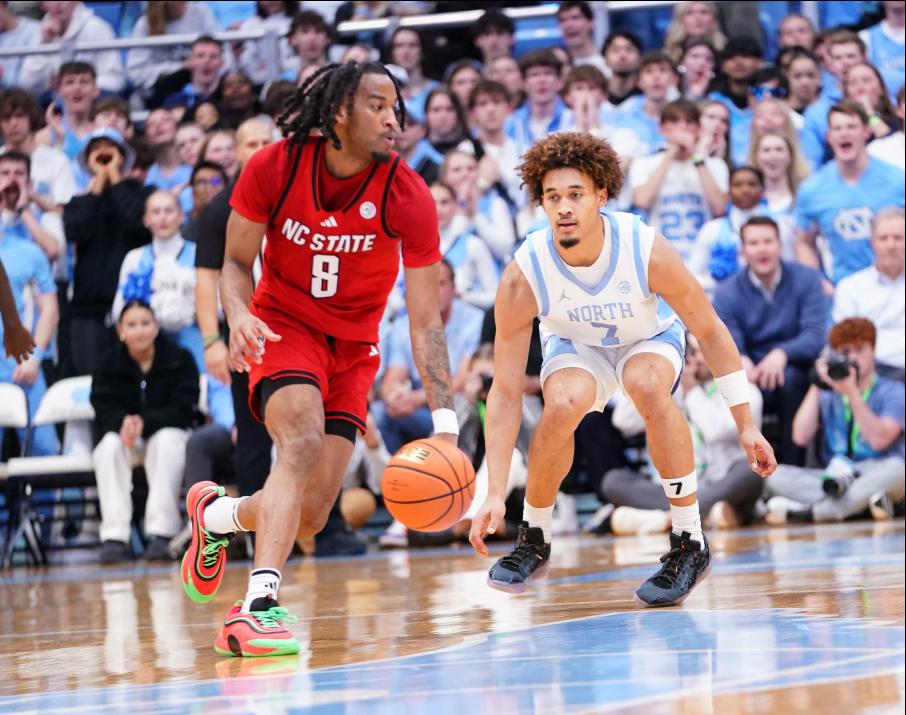Senate budget mandates UNC, NC State play in-state teams, doubles sports betting tax
North Carolina Senate Republicans plan to increase the amount of tax revenue that flows to athletic departments at UNC System schools, add UNC and NC State to that distribution and double the tax rate on sports betting operators as part of its budget proposal.
The budget would also mandate that UNC and NC State play basketball games against other schools in the UNC System, a requirement that is connected to the revenue distribution.
Senate Republicans released their two-year budget Monday evening. They plan to pass it this week. Republicans have a big majority in the Senate.
The proposal could mean tens of millions for the athletic departments at UNC and NC State, just as the schools are expected to begin sharing revenue with athletes.
Legal online sports wagering launched in North Carolina on March 11, 2024. The eight legal operators have paid more than $135 million in taxes through the end of March 2025. Sports bettors in the state are expected to claim winnings on their taxes without being able to write off losses.
The increase from an 18% tax rate to a 36% tax rate would put North Carolina among the top in the nation with New York (51%), New Hampshire (51%), Delaware (50%), Illinois (up to 40%) and Pennsylvania (36%).
The Sports Betting Alliance, which represents operators such DraftKings, FanDuel, BetMGM and Fanatics, declined comment Monday evening. All four of those operators are taking bets in North Carolina.
The proposed budget would make significant changes to the distribution of tax revenue. Currently, the athletic departments at 13 UNC System schools receive $300,000 from the tax revenue from sports betting and then receive 20% of remaining proceeds after other initial required distributions are made.
UNC and NC State are not currently included.
But under the budget proposal, the schools would receive more, but unequal, amounts.
The athletic departments at Elizabeth City State University, Fayetteville State University, University of North Carolina at Pembroke and Winston-Salem State University would each receive $500,000.
North Carolina A&T, UNC-Asheville, UNC-Greensboro, UNC-Wilmington and Western Carolina would receive $1 million. Appalachian State, East Carolina and UNC Charlotte would receive $1.5 million.
After those schools are paid and other required distributions, 20% of the remaining proceeds would be split among those same schools, 10% each would go to UNC, NC State and the North Carolina Major Events, Games, and Attractions Fund. The remaining money would go to the state’s General Fund.
North Carolina took in about $128.5 million in tax revenue from operators in the first 12 months. Under the Senate’s proposal, the first $17 million would be allocated. That would leave UNC and NC State to each get 10% of $111.5 million remaining revenue or about $11.5 million each.
And that’s without considering any growth in the tax rate or the tax revenue.
“It’s our feeling that the success of the sports wagering program itself is something that has inured to the benefit of many of the campuses, and we wanted to extend it to other campuses,” said Senate leader Phil Berger, a Rockingham County Republican.
The budget would require UNC and NC State to play at least three regular-season or exhibition basketball games against each UNC System school at the NCAA Division II level by the 2039-40 season. And two regular-season games against each UNC System school competing at the NCAA Division I level by the same year.
There are four Division II schools and 11 Division I schools, including UNC and NC State, in the UNC System. The budget document doesn’t specify men’s or women’s basketball or both.
Previously, several lawmakers have introduced bills that would use the sports wagering tax revenue for various other programs.
One measure (House Bill 384) would use revenue from sports betting to offset a tax deduction for members of the National Guard. Another (Senate Bill 657) would dip into the revenue for stipends for high school coaches. Yet another (Senate Bill 533) would direct more of the money toward gambling addiction prevention services.
Source: wral.com
